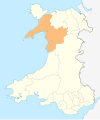Rhydyronen railway station
Rhydyronen | |
|---|---|
| Station on heritage railway | |
 Rhydyronen station, taken from the road bridge, looking west | |
| General information | |
| Location | Bryncrug, Gwynedd Wales |
| Coordinates | 52°36′00″N 4°02′46″W / 52.600°N 4.046°W |
| Grid reference | SH614021 |
| Operated by | Talyllyn Railway Preservation Society |
| Platforms | 1 |
| History | |
| Original company | Talyllyn Railway Company |
| Key dates | |
| 1867 | Opened |
| c. 1900 | Loop built |
| 1951 | Operation taken over by Talyllyn Railway Preservation Society |
| 1954 | Siding removed |
| 1957 | Loop reinstated |
| 1971 | Loop west points removed |
| 1977 | Siding removed |
| 1979 | Platform extended |

Rhydyronen railway station (also known as Rhyd-yr-onen railway station) is a request stop on the Talyllyn Railway, near Tywyn, Gwynedd in mid-Wales. It was built in 1867[1] to serve local farms, and the village of Bryn-crug.
The name 'Rhyd-yr-onen' means 'Ford of the ash tree'.
Construction[edit]
The station building and original platform are primarily constructed out of slate blocks from Bryn-Eglwys quarry.[2] The platform surface is slate chippings and is edged with slate slabs. The 1990s platform extension uses concrete breeze blocks.
History[edit]
Origins and early history[edit]
The station opened in February 1867,[3] four months after the start of passenger services on the railway.[1] The station is named after a nearby stream, the Nant Rhyd-yr-onnen (this stream is also known as the Nant Braich-y-Rhiw), which itself is named after the road's ford over it, just north of the station (now replaced with a bridge).[1] It is 2.15 miles (3.46 km) along the railway from Tywyn Wharf,[1] and was the first intermediate station to open on the railway.[3] A station building and platform was provided on the north side of the track,[1] as the carriages had been modified to have doors only on this side for safety reasons.[3] Steps were provided to the road on the south side, for passengers wishing to travel (across the track) southwards. The station had a passing loop at its western end, first shown on Ordnance Survey maps in 1901,[4] to serve a slate quarry and manganese mine.[5] A mineral tramway had been planned to serve the mine and quarries,[5] but the necessary agreements were not reached with the local landowner Dr. Corbett.[5][6] The outputs of the quarries and mine therefore had to be taken by road to the station, and the business soon failed.[5] The loop soon fell into disuse and the west points were removed.[5]
Around the 1930s there appears to have been an accident here involving a goods van, and for several decades the van's body lay rotting beside the road bridge.[1] During the Victorian era, the railway promoted the destination to tourists through references to a nearby chalybeate spring, and bottled water was produced here around the 1910s.[3]
Preservation era[edit]
The siding was still in a good enough condition (relative to the rest of the permanent way of the railway) to be used as a refuge siding in 1951. This allowed the first train operated by the preservation society to run round. The train was hand-shunted past the locomotive, which was stabled in the siding.[3]
The remaining siding was removed during track renewals in early 1954, but it was reinstated, as a full loop, in the winter of 1956/1957, and was usable by late January.[4] The loop was never used as a passing place for public train services during preservation; its main role was as an engineers' siding.[4] Rhydyronen was used for rail storage at the time,[4] and also for the stabling of a locomotive – or the railway's motor trolley following the building of this machine – for the transport of railway volunteers, most notably Hugh Jones, who lived, or were staying on holiday, nearby. The west end points of the new loop were removed in 1971,[4] again because of the economic costs of maintaining the points, of what was a double-ended engineers' siding – which saw limited use. The remaining siding was removed, with the east points, in August 1977.[4] The platform was extended to accommodate a full-length train in 1979.
In fiction[edit]
In The Railway Series by Rev. Wilbert Awdry, and in the fourth season of Thomas & Friends, Cros-ny-Curin station on the Skarloey Railway is based on this station.
References[edit]
- ^ a b c d e f Talyllyn handbook. The Talyllyn Railway Preservation Society. 1983.
- ^ Burton, Anthony (28 February 2017). A Steam Engine Pilgrimage. Pen and Sword. pp. 75–. ISBN 978-1-4738-6047-6.
- ^ a b c d e Rolt, L.T.C. (1953). Railway Adventure.
- ^ a b c d e f "Talyllyn news" – the quarterly newsletter of the Talyllyn Railway Preservation Society – issue no.252, page 2.
- ^ a b c d e "Talyllyn News" – the TRPS' quarterly newsletter, issue number 260, pages 40, 41, & 42.
- ^ Boyd, James I. C. (1988). The Tal-y-llyn Railway. Wild Swan Publications Ltd. ISBN 0-906867-46-0.
- Talyllyn Railway Guide Book
External links[edit]
- "Talyllyn Railway route information". Retrieved 10 October 2010.
| Preceding station | Following station | |||
|---|---|---|---|---|
| Cynfal | Talyllyn Railway | Tynllwynhen | ||

